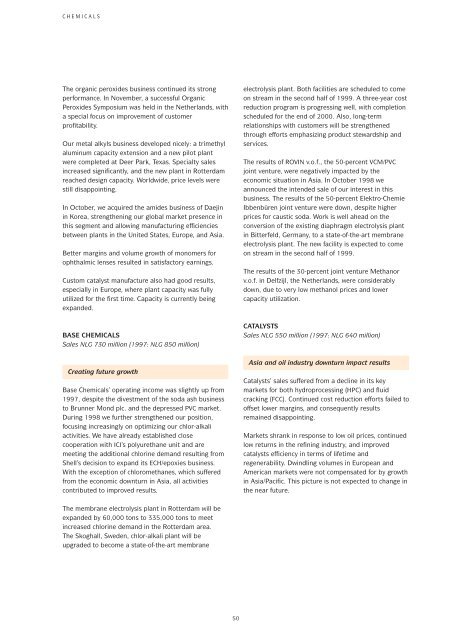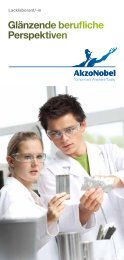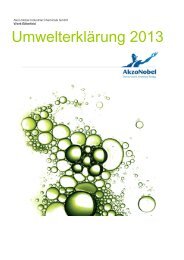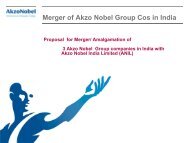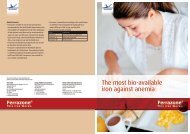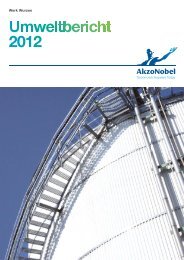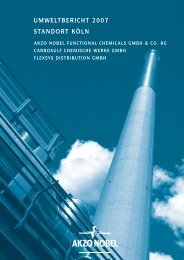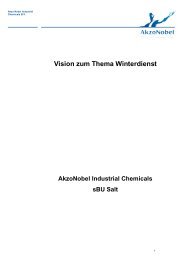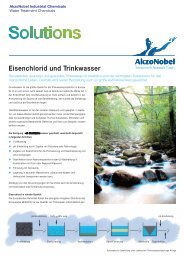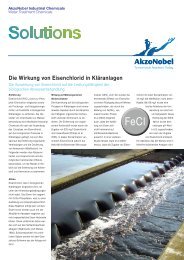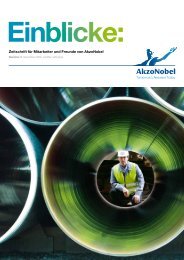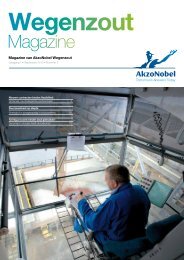You also want an ePaper? Increase the reach of your titles
YUMPU automatically turns print PDFs into web optimized ePapers that Google loves.
CHEMICALS<br />
The organic peroxides business continued its strong<br />
performance. In November, a successful Organic<br />
Peroxides Symposium was held in the Netherlands, with<br />
a special focus on improvement of customer<br />
profitability.<br />
Our metal alkyls business developed nicely: a trimethyl<br />
aluminum capacity extension and a new pilot plant<br />
were completed at Deer Park, Texas. Specialty sales<br />
increased significantly, and the new plant in Rotterdam<br />
reached design capacity. Worldwide, price levels were<br />
still disappointing.<br />
In October, we acquired the amides business of Daejin<br />
in Korea, strengthening our global market presence in<br />
this segment and allowing manufacturing efficiencies<br />
between plants in the United States, Europe, and Asia.<br />
Better margins and volume growth of monomers for<br />
ophthalmic lenses resulted in satisfactory earnings.<br />
Custom catalyst manufacture also had good results,<br />
especially in Europe, where plant capacity was fully<br />
utilized for the first time. Capacity is currently being<br />
expanded.<br />
BASE CHEMICALS<br />
Sales NLG 730 million (1997: NLG 850 million)<br />
Creating future growth<br />
Base Chemicals’ operating income was slightly up from<br />
1997, despite the divestment of the soda ash business<br />
to Brunner Mond plc. and the depressed PVC market.<br />
During 1998 we further strengthened our position,<br />
focusing increasingly on optimizing our chlor-alkali<br />
activities. We have already established close<br />
cooperation with ICI’s polyurethane unit and are<br />
meeting the additional chlorine demand resulting from<br />
Shell’s decision to expand its ECH/epoxies business.<br />
With the exception of chloromethanes, which suffered<br />
from the economic downturn in Asia, all activities<br />
contributed to improved results.<br />
The membrane electrolysis plant in Rotterdam will be<br />
expanded by 60,000 tons to 335,000 tons to meet<br />
increased chlorine demand in the Rotterdam area.<br />
The Skoghall, Sweden, chlor-alkali plant will be<br />
upgraded to become a state-of-the-art membrane<br />
50<br />
electrolysis plant. Both facilities are scheduled to come<br />
on stream in the second half of 1999. A three-year cost<br />
reduction program is progressing well, with completion<br />
scheduled for the end of 2000. Also, long-term<br />
relationships with customers will be strengthened<br />
through efforts emphasizing product stewardship and<br />
services.<br />
The results of ROVIN v.o.f., the 50-percent VCM/PVC<br />
joint venture, were negatively impacted by the<br />
economic situation in Asia. In October 1998 we<br />
announced the intended sale of our interest in this<br />
business. The results of the 50-percent Elektro-Chemie<br />
Ibbenbüren joint venture were down, despite higher<br />
prices for caustic soda. Work is well ahead on the<br />
conversion of the existing diaphragm electrolysis plant<br />
in Bitterfeld, Germany, to a state-of-the-art membrane<br />
electrolysis plant. The new facility is expected to come<br />
on stream in the second half of 1999.<br />
The results of the 30-percent joint venture Methanor<br />
v.o.f. in Delfzijl, the Netherlands, were considerably<br />
down, due to very low methanol prices and lower<br />
capacity utilization.<br />
CATALYSTS<br />
Sales NLG 550 million (1997: NLG 640 million)<br />
Asia and oil industry downturn impact results<br />
Catalysts’ sales suffered from a decline in its key<br />
markets for both hydroprocessing (HPC) and fluid<br />
cracking (FCC). Continued cost reduction efforts failed to<br />
offset lower margins, and consequently results<br />
remained disappointing.<br />
Markets shrank in response to low oil prices, continued<br />
low returns in the refining industry, and improved<br />
catalysts efficiency in terms of lifetime and<br />
regenerability. Dwindling volumes in European and<br />
American markets were not compensated for by growth<br />
in Asia/Pacific. This picture is not expected to change in<br />
the near future.


